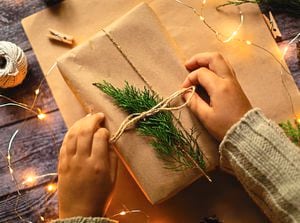Are you dreaming of a green Christmas? Here are a few of the way the festive season as ecologically friendly as possible
From food and drink to gifts and decorations, the festive season has always been a time for excess.

But as we become increasingly aware of the environmental impact our celebrations can have, many of us are looking to cut back and do more to help the planet.
The UK produces an additional three million tonnes of waste at Christmas and fills 100 million bin bags every year.
It’s estimated that around 227,000 miles of wrapping paper is used each year with a large amount ending up in landfill and around £42 million of unwanted gifts are also thrown straight in the bin.
If you’re looking to reduce your environmental footprint then there are plenty of ways to have a greener and more sustainable Christmas.
Decorations
When it comes to choosing a Christmas tree, many people are left pondering whether a real tree is better than an artifical tree for the environment. According to The Carbon Trust that depends on the specific tree, and plans for reuse and ultimately disposal.
It says an artificial tree used over multiple years – seven to 20 times depending on the weight and different materials in the tree – is better for the environment than buying a new, commercially grown tree every year.
For real trees, those that are slow grown and use no fertilizer are preferable to those intensively grown. Check to see if it is certified by the Forest Stewardship Council, which ensures minimal fertiliser is used.
Potted trees with roots can be re-used, spreading the carbon footprint over multiple years and potentially avoiding transport emissions, making them a more sustainable option if you’re after a real Christmas tree.
If you are not reusing your real tree for next year then many councils offer collection services, where used Christmas trees are picked up and recycled. Some charities also arrange collections and will ask for a small donation in exchange for the service. The trees are shredded, then used as mulch on plants in parks or on woodland paths, or for compost.
Unless your tree decorations are damaged or broken, do your best to reuse them each year. Baubles and ornaments used every Christmas will be more special because they will have more memories attached to them.
If you need new ones then consider looking for hidden gems in the local charity or vintage shop.
Instead of plastic ones that are more likely to break, choose materials such as wool, wood, rattan and recycled glass.
Instead of buying a wreath for your front door, consider making your own using natural materials, such as holly from the garden that can be composted in January, or items that can be saved and reused next year.
The vast majority of gifts inside Christmas crackers never last beyond the end of the meal. Consider getting crackers with just jokes and hats, and make sure to recycle the paper and cardboard afterwards.
Gifts
When it comes to gifts, there are so many simple ways you can support the planet, while giving your family and friends something they will love.
Rich Quelch, from sustainable packaging firm, Lifestyle Packaging (www.lifestylepackaging.com) shares his ideas for more environmentally-friendly presents.
Make your own festive treats
Rather than relying on shop-bought sweets and bakes, why not roll up your sleeves and make your own delicious festive treats?
Bake up a batch of your favourite biscuits, salted caramel toffees or fruit jam. Or, for those who don’t have a sweet tooth, try your hand at cheese and rosemary biscuits or toasted nuts.
Present your homemade goodies in decorative glass jars that your friends and family can reuse time and time again.
If baking isn’t for you or you don’t have the equipment, you can build your own recipe kits with the dry ingredients and the instructions for the perfect DIY gift.
Support positive change
It’s the thought that counts, right? Not everyone wants to unwrap a gift but that doesn’t mean that your hard-earned money can’t go towards a worthy cause.
In a loved one’s honour, donate to a charity or non-profit organisation close to their heart. Save the Children has several different items, starting from £8, which will be donated to children in need. These items range from toys to food and medical supplies.
For someone passionate about the environment, consider donating to an organisation like the Woodland Trust. For £10, the organisation will help plant more trees, working towards their ambitious target of 50 million planted across the UK.
Buy local
Rather than purchasing a mass-produced product from a large online retailer, consider buying your Christmas gifts closer to home.
Supporting small businesses this festive season has many benefits for the environment, as well as for your local community.
Your gift will have a much smaller carbon footprint, as it has not travelled hundreds of miles to a warehouse, store or in a delivery van to your door, especially if you pick handmade items using locally sourced materials and labour.
The gift that keeps giving
Living a waste-free life can be challenging. But as more of us are looking for ways to live more sustainably, why not purchase a gift that helps people reduce waste?
For the coffee lover, a reusable glass or silicon coffee cup can cut out the need for shop-bought ones on the go. For the beauty lover, gift reusable make-up remover pads or plastic-free haircare bars.
For those that love cooking, reusable wax wraps, a stainless-steel lunch box or a compost bin are perfect gifts that are practical and reduce waste.
This year’s must-have toys
For children, Christmas is all about toys. The problem is many are made from plastic that ends up discarded in the natural environment.
Wooden toys made from sustainably sourced wood are a much more environmentally friendly option that can be recycled. They’re also body-safe and durable.
Toys made from wool felt are another great option as they’re completely biodegradable. Be sure to use wool felt, as some felt is made from synthetic materials that are not recyclable.
From food items to cuddly animals, head onto YouTube to find easy tutorials on how to make your own.
Cards
Always opt for Christmas cards made from sustainably sourced or recycled paper and avoid choosing those covered in glitter.
Glitter is notoriously hard to recycle and is such a concerning environmental hazard that high-street stores such as Marks & Spencer have announced they will be no longer be offering shoppers the option of sparkly Christmas cards or gift-wrap.
Most cards are paper-based and can be recycled, along with their envelopes, either in your household recycling collection, at local recycling points such as household waste recycling centres or at collection banks in supermarket car parks.
Recycle Now says that any embellishments such as ribbons or glitter cannot be recycled so should be removed first by simply tearing off that section. Batteries should also be removed from musical cards and disposed of at battery recycling points.
But if you’re looking to go that extra mile, why not ditch the physical Christmas card this year and send an e-card instead?
Wrapping
Traditional wrapping paper is often dyed or laminated and may contain bits of glitter which makes it unrecyclable.
If you want to know if your wrapping paper can be recycled or not, use the scrunch test. Scrunch up the paper in your hards and then let it go. If the paper stays scrunched up then it can be recycled but, if it unfolds by its own accord, then it likely contains non-recyclable elements.
Alternatives to wrapping paper are brown paper, recyclable gift wrap and compostable tissue paper.
Paper tape is a much eco-friendlier alternative to conventional tape, which is made from plastic. Water-activated tape uses an adhesive that’s water based and doesn’t leave any sticky residue so your wrapping paper can be kept for the recycling.
Another option is to reuse the paper next year by applying very small amounts of tape to make it easier to avoid having to tear it. Then you can save what you can for Christmas 2022.
If you’re left with a small section at the end of a roll of wrapping paper, don’t throw it away. Instead, layer your scraps – either by looping one small section on top of another, or by creating a half-and-half effect.
Reuse paper gift bags from previous years instead of buying new ones or consider investing in fabric bags that can be reused over and over again.
There are many tape-free wrapping techniques online to try, or you can try furoshiki, a traditional Japanese method of using cloth to wrap and transport gifts. Old maps, calendars and newspapers can also make great gift wrapping.
Making your own gift tags can be made from last year’s Christmas cards can help cut down on waste. Natural items such as holly and brown string can make attractive embellishments instead of ribbons.
Food
It’s estimated that around 1,300 tonnes of turkey, 172 tonnes of sprouts, 848 tonnes of roast potatoes and 375 tonnes of mince pies are wasted every year in Britain.
By planning your festive meals in advance, you can drastically reduce the amount of food you waste at home.
It can all start with a simple shopping list. Going to the supermarket and picking up whatever you takes your fancy from the shelves puts you at risk of duplicating items you already have in the kitchen
Love Food Hate Waste recommends always checking what food you already have in your home before going to the supermarket or market to avoid doubling up on items you already have.
Be realistic about what you or your family will eat. If there’s something you always make at Christmastime because “it’s traditional”, but no one actually eats it, leave it off the menu.
Consider the edible life of the food you are buying and the space you realistically have for keeping it fresh.
Limit the ‘buy just in case we need it’ food for food you fancy during the week ahead – rather than three weeks ahead.
It’s often these ‘just in case’ foods that we don’t eat in time and chuck in the bin.
There is really no need to stock up as supermarkets will be open for most days in December.
Don’t waste any leftovers, save them for the next day by covering it with eco-friendly cling film alternatives such as Tupperware, foil or wax cloth covers/
Look for recipes for simple one pot wonders to use up all your odd bits of food that need eating.
If you still don’t think you will eat it all in time then freeze what you can so you can enjoy it at a later date.
Festive items such as turkey and mince pies can be safely frozen as long as they are stored in airtight bags and containers.
The World Wide Fund for Nature also has tips on how to make your food habits over Christmas friendlier to our planet.
It says when shopping for food, look for UK produce to reduce food miles, avoiding food that’s been flown around the world to get here, and sustainability certifications such as RSPO-certified palm oil and MSC-certified seafood. To help you, the GIKI app provides ethical and sustainability information about more than 280,000 supermarket products.
Buying locally-produced products when they’re in season can ensure your shopping basket is more sustainable as it reduces the energy that might have been spent growing foods out of season – such as hot-house tomatoes – or food that have been shipped to the UK, such as asparagus from Peru in winter.





